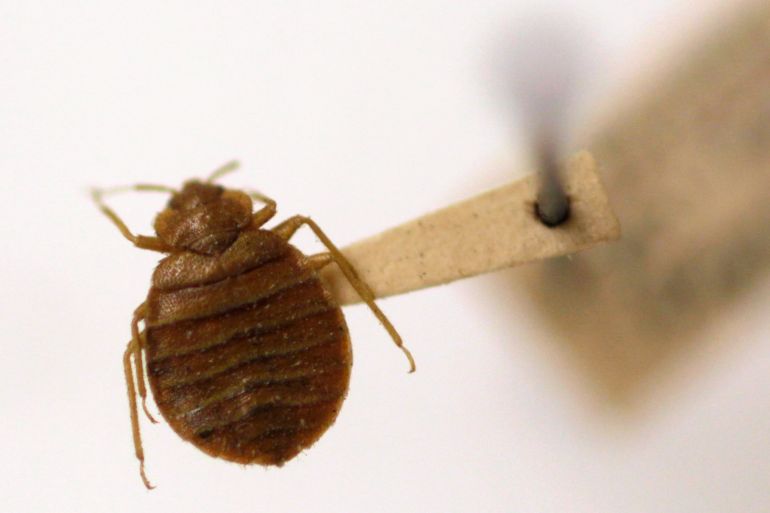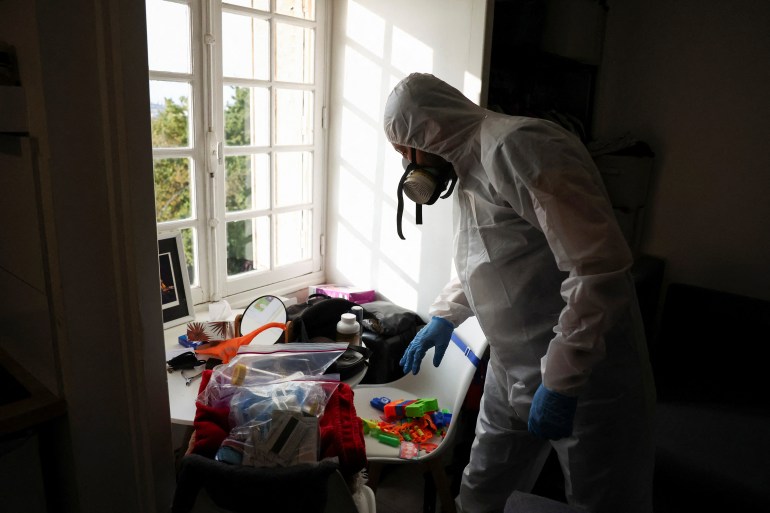What’s Paris doing to solve the bedbug crisis ahead of 2024 Olympic games?
The rise in bedbugs in Paris is linked to increasing travellers and insecticide resistance.

As Paris gears up to welcome an anticipated half a million visitors during the 2024 Summer Olympics, there are some uninvited guests that they are battling to get rid of.
The French government announced last week it was launching a concerted effort to fight bedbugs, which get their name from their habit of nesting in mattresses, that have appeared in numbers in public transport, cinemas and hospitals.
Keep reading
list of 4 itemsMeasles outbreak kills at least 42 people in northeast Nigeria
I spent 43 days in Gaza’s now-destroyed hospitals. My mind is still there.
What is behind the insulin shortage in the US?
The blood-sucking insects have been spotted in the Paris Metro, high-speed trains, and at Paris’s Charles de Gaulle airport, with disgusted travellers posting videos on social media.
“The state urgently needs to put an action plan in place against this scourge as France is preparing to welcome the Olympic and Paralympic games in 2024,” the capital’s deputy mayor, Emmanuel Gregoire, said in a letter to Prime Minister Elisabeth Borne this week.
Here’s what you need to know about the infestation and efforts to solve it.
When did the bedbug problem start?
Over the summer, people began complaining online about bedbugs in movie theatres. They posted pictures of bug bites following a cinema visit on Twitter, formerly X.
More recently, residents and tourists have spotted bedbugs in hotels, metro rail, high-speed trains and at the airport.
There was also concern about the spread of bedbugs during Paris Fashion Week, which ended on Tuesday.
Is this the first time bedbugs have infested Paris?
No. While bedbugs were considered to be eradicated in France in the 1950s, the pesky little critters have made a recent resurgence.
ANSES, the French Agency for Food, Environmental and Occupational Health Safety, reported that between 2017 and 2022, more than one in 10 households were infested by bed bugs.
Extermination experts reported that 400,000 addresses, including hotels, apartments and houses, were treated in Paris in 2018.
In 2020, the French government launched a campaign that included a bedbug hotline and a dedicated website to tackle the issue.

Why are the bedbugs back?
In earlier years, potent insecticides such as DDT were widely used. Such chemicals have since been banned for being too harmful and have resulted in a bedbug resurgence in recent years.
In a report released in July, ANSES attributed the rise in bedbugs to “the rise in travel and the increasing resistance of bed bugs to insecticides”.
What is Paris doing to solve the bedbug crisis?
For now, it appears that the French capital is at the beginning stages of its effort to tackle the problem.
Paris city hall on Thursday urged President Emmanuel Macron’s government to help tame the infestation, including by creating a dedicated task force.
Transport Minister Clement Beaune said on Friday that he will have a discussion with transport operators next week about methods to counter the issue and protect commuters.
Deputy Mayor Gregoire has called on insurers to include bedbug cover in house insurance policies, as low-income people rarely had the means to call in pest control firms.
Gregoire added that bedbugs have existed in Paris previously and will continue to do so. He sees the Olympics, which will kick off in late July 2024, as an opportunity for everybody to work together on the issue.
However, Ondřej Balvín, head of the Czech University of Life Sciences’s Bed Bugs Research Team in Prague, told Al Jazeera on Tuesday that it will be difficult for Paris to solve the infestation.
“It is difficult for me to imagine that government is anyhow entitled or able to fight bedbugs in a country,” he said. “The problem occurs in private beds. The government could help [by] getting new chemicals to the market, or support the entities that educate pest controllers, or take the pest control guidelines more in its hands.”
What can people do to fight against bedbugs?
ANSES recommended in its report that non-chemical methods should be used to eradicate the bedbugs, such as using dry heat from a hot air dryer to treat infested clothing and bedding or keeping the infested fabric at freezing temperatures for a few days.
While heat can be used for an entire room, freezing is better for treating clothing or small objects, said the report.
The use of chemical methods such as insecticides is discouraged because bedbugs are becoming increasingly resistant to insecticides, which is making them ineffective. This is why the bedbugs are rising in numbers in the first place.
Chemical methods can also pose additional hazards to human health and the environment.
“The problem in Europe is that these substances are heavily regulated,” said Balvín from the Bed Bugs Research Team.
“The options are limited and I would say [we’re in] a state of a steady fight with the bedbugs with not much chances for a quick improvement, at least for humans.”